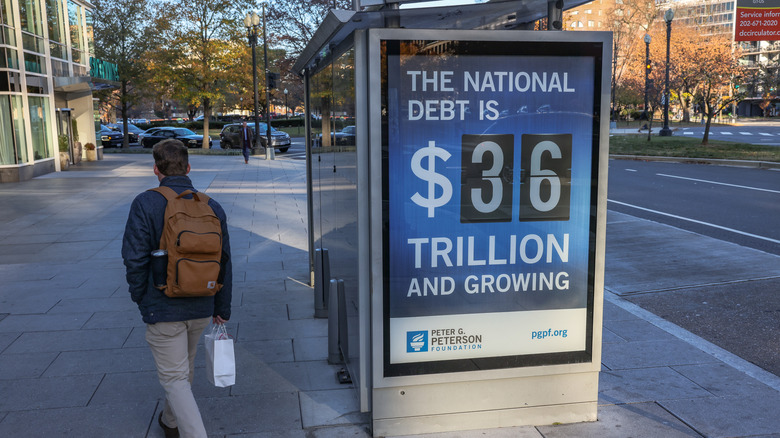Galloway Reveals Grim Financial Warning About Trump Policies
While there has been plenty of discussion surrounding the potential economic policies of President-elect Donald Trump, some are more concerning than others. Tariffs (we broke down what they are and who pays for them) in particular have been a sticking point for many economists who argue they will raise prices for consumers on everything from furniture to clothes to phones. However, while tariffs are definitely taking up the most ink ahead of 2025, there is another economic concern that consumers should be similarly focusing on — the national deficit.
As a quick refresher, the national deficit is the amount of money that the federal government spends every year that exceeds the amount it collects in revenue. While the deficit is the exact amount the government overspends in a given fiscal year, this money adds up as part of the national debt (which surpassed $35 trillion in 2024). As the country's debts continue to add up, the U.S. also faces an issue with its debt-to-GDP ratio. This ratio can be significant when determining a country's ability to actually pay down its debt. However, with the U.S. well over 100% in its debt ratio, the chances the country can pay off its existing debts grows slimmer every year, meaning that adding even more onto the country's existing deficits could lead to dangerous financial issues down the road. This brings us to New York University marketing professor, author, and podcast host, Scott Galloway, who explained to CNN that, "under the Trump administration versus the Harris economic plan, deficits are going to be triple."
Understanding the deficit
It's worth mentioning that just one week before the November Presidential election, the Committee for a Responsible Federal Budget put out a report stating that Donald Trump's proposed economic policies would cause a significant increase to the current federal deficit. More specifically, Trump's policies would cost more than double the proposed policies of the Harris campaign, adding $7.75 trillion to the current deficit. However, it's also worth mentioning that this estimate is only the midpoint of Trump's potential deficit increase, with the Committee putting the high end of his potential deficit impact closer to $15.55 trillion.
Some of the specific ways that Trump's policies will contribute to the national deficit include expanding proposed tax cuts for both corporations and consumers as well as high-cost policy proposals ranging from expanding the military to securing the border. On top of this, Trump has also suggested several policies that would reduce the amount of money the federal government is able to collect in revenues every year. Specifically, policy proposals like eliminating taxation on tips (which became an election flashpoint), ending taxation on Social Security benefits and ending taxation on overtime income will all reduce the country's annual revenue amounts. These, coupled with his higher prices policy proposals will create an even wider gap between how much the country earns vs. how much it spends. This will greatly increase the country's already significant national debt, and while in the immediate the consequences of this debt might not be obvious, the long-term ramifications can greatly hurt future generations.
Why the deficit hurts the young
Galloway explained the complicated way that high deficits can ultimately hurt young people to Anderson Cooper, "It's great for you and me, Anderson, because we own homes and we own stocks, and the stimulus of that deficit spending will take the value of our stocks and our real estate up. But our kids are going to have to pay that back at some point." The increase of the national debt can lead to fewer economic opportunities thanks to reduced business investment, slower economic growth, higher rates of inflation, and even the devaluing of the U.S. dollar. Galloway went on to say, "deficits are nothing but delayed taxes on the young."
Ultimately the country's debt will be due, and deferring that eventual consequence down the line leaves the burden of repayment on younger generations who will simultaneously face a weaker economy due to mounting national debts. It's also worth noting that as the debt increases the interest due also grows. According to the Peter G. Peterson Foundation interest costs were $658 billion in 2023, meaning the U.S. spent more on net interest costs for debts than it did on other social services like Medicaid and veterans benefits. As interest costs increase, the country could face having even less money to invest in important public projects, programs, services, and even infrastructure needs. Similarly, as climate-change-fueled natural disasters (which affect everything from the stock market to insurance rates) increase in frequency, the country will be less equipped to respond to crises as they occur.


